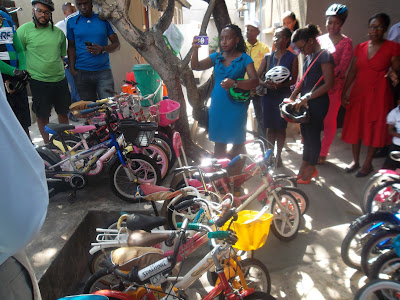Brazzaville/Kinshasa, 2 July 2017 –
Today, the World Health Organization (WHO) declared the end of the most
recent outbreak of Ebola virus disease (EVD) in the Democratic Republic
of Congo (DRC). The announcement comes 42 days (two 21-day incubation
cycles of the virus) after the last confirmed Ebola patient in the
affected Bas-Uélé province tested negative for the disease for the
second time. Enhanced surveillance in the country will continue, as well
as strengthening of preparedness and readiness for Ebola outbreaks.
"With
the end of this epidemic, DRC has once again proved to the world that
we can control the very deadly Ebola virus if we respond early in a
coordinated and efficient way,” said Dr Tedros Adhanom Ghebreyesus, WHO
Director-General.Related to the outbreak, 4 people died, and 4 people survived the disease. Five of these cases were laboratory confirmed. A total of 583 contacts were registered and closely monitored, but no known contacts developed signs or symptoms of EVD.
On 11 May 2017, WHO was notified by the Ministry of Public Health of the virus among a cluster of undiagnosed illnesses and deaths with haemorrhagic signs in Likati Health Zone. Likati is a remote, hard to reach area, which shares borders with the Central African Republic and two other provinces of DRC. Cases of the disease were reported in four health districts. This is DRC’s eighth outbreak of EVD since the discovery of the virus in the country in 1976.
The effective response to this latest EVD outbreak in Africa was achieved through the timely alert by local authorities of suspect cases, immediate testing of blood samples due to strengthened national laboratory capacity, the early announcement of the outbreak by the government, rapid response activities by local and national health authorities with the robust support of international partners, and speedy access to flexible funding. Coordination support on the ground by the WHO Health Emergencies Programme was critical and an Incident Management System was set up within 24 hours of the outbreak being announced. WHO deployed more than 50 experts to work closely with government and partners.
Dr Matshidiso Moeti, the WHO Regional Director for Africa, who visited DRC in May to discuss steps to control the outbreak, said the country had shown exemplary commitment in leading the response and strengthening local capacities. “Together with partners, we are committed to continuing support to the Government of DRC to strengthen the health system and improve healthcare delivery and preparedness at all levels,” she said.
Work with the government of DRC continues to ensure that survivors have access to medical care and screening for persistent virus, as well as psychosocial care, counselling and education to help them reintegrate into family and community life, reduce stigma and minimize the risk of EVD transmission.
Announcing that the outbreak of Ebola in DRC was over, Dr Oly Ilunga Kalenga, the country’s Minister of Health said, “I urge that we now focus all our efforts on strengthening the health system in Bas- Uélé province, which has been stressed by the outbreak. Without strengthening the health system, effective surveillance is not possible."
WHO coordinated international technical support for the outbreak with Partners in the Global Outbreak Alert and Response Network (GOARN) and the Dangerous Pathogens Laboratory Network. Other key Partners supporting the DRC government in their response included Africa Centres for Disease Control and Prevention; Alliance for International Medical Action (ALIMA); European Union (EU); the government of the People’s Republic of China; the International Federation of Red Cross and Red Crescent Societies (IFRC); the International Organization for Migration (IOM); Japan International Cooperation Agency (JICA); Médecins sans Frontières (MSF); Red Cross of the DRC; UNICEF; United States Agency for International Development (USAID); United States Centers for Disease Control and Prevention (CDC); the United Kingdom Department for International Development (DFID); the University of Québec, Canada; and the World Food Programme (WFP).
The WFP/Logistics Cluster and UNICEF supported warehousing capacity in Buta and Likati and the United Nations Humanitarian Air Service (UNHAS) set up a base for air operations from Buta, while the United Nations Organization Stabilization Mission in DR Congo (MONUSCO) helped transport response teams and urgently needed supplies to the affected zone.
FROM THE WHO WEBSITE





